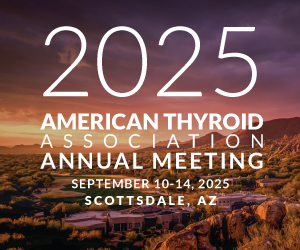
Is Prescription Levothyroxine Really an Artificial Hormone?
Rupendra T. Shrestha, MD
University of Minnesota, Minneapolis, MN
December 20, 2020
Many patients try to avoid synthetic products and processed food as much as possible. This might imply that a hormone replacement considered natural is better. How do “natural” animal-derived thyroid hormone products differ from “synthetic” levothyroxine?
To understand this, we must understand some of the basics. The main hormone a thyroid gland produces is thyroxine – a molecule of tyrosine with four iodine bound to it. Thyroxine has left and right enantiomers – the same exact molecule rotated either to the left or to the right – levo- and dextro, respectively. Our bodies make thyroxine that is left rotated (or levothyroxine). The right rotated dextrothyroxine does not have any thyroid hormone action.
Levothyroxine brands and generics are all molecularly identical to levothyroxine — exactly the same molecule that the thyroid would be producing if it was to function normally! Therefore, if the manufactured compound is the exact compound that which we make naturally, is it synthetic or natural?
“Natural thyroid hormones” (such as Armour®, Nature-Throid®, or others) contain both levothyroxine and liothyronine. In these products, the levothyroxine is exactly the same as the synthetic versions, but the product is derived from a sheep or pig rather than from a machine. The liothyronine, or T3, is the more active form of thyroid hormone. Naturally, the thyroid produces a very small amount of T3. Most T3 is converted from T4 on an as-needed basis by various organs. Different organs require different amounts of T3 based on their metabolic state.
There are many people who do not get adequate symptom relief with levothyroxine and try animal thyroid extracts. These drugs are not approved by the FDA, and people who take them can end up overdosing thyroid hormone. This excess thyroid hormone is not without risks. Symptoms can include feeling warm, obtaining less sleep, and restlessness (which many perceive as increased energy). It also increases the risk of heart problems such as atrial fibrillation and can increase the risk of osteoporosis. Despite this, there may be some individuals who actually do benefit from T3. However, research has shown these patients are in the minority. Therefore, if taking animal thyroid extracts seem to give symptomatic improvement by giving higher dose of thyroid, it may come at a price.
If thyroid labs are normal on levothyroxine but a patient has persistent symptoms, one important step is to assess for other confounding problems such as sleep issues, lack of exercise and other chronic medical problems prior to considering a change in thyroid hormone.
In summary, while levothyroxine is made artificially, it is the exact molecule that our natural thyroid gland would have produced. On the other hand, the thyroid hormone extracts that are advertised as “natural products” are produced from the glands of animals, and the dosing is difficult to match to human requirements. Some patients may end up getting more hormone than is required and that can give a false sense of “improvement.” There may be some individuals who might benefit from additional T3, and more research is needed in this area.
For Further Reference:
American Thyroid Association Thyroid Hormone Treatment Brochure
Disclaimer:
The ideas and opinions expressed on the ATA Blogs do not necessarily reflect those of the ATA. None of the information posted is intended as medical, legal, or business advice, or advice about reimbursement for health care services. The mention of any product, service, company, therapy or physician practice does not constitute an endorsement of any kind by ATA. ATA assumes no responsibility for any injury or damage to persons or property arising out of or related to any use of the material contained in, posted on, or linked to this site, or any errors or omissions.



